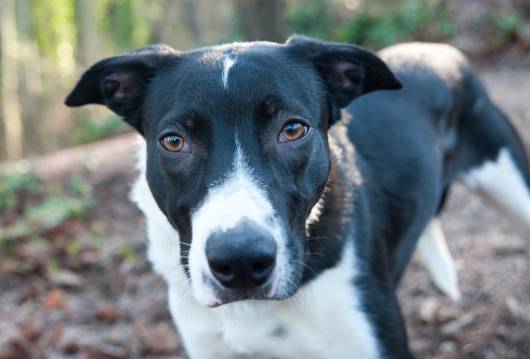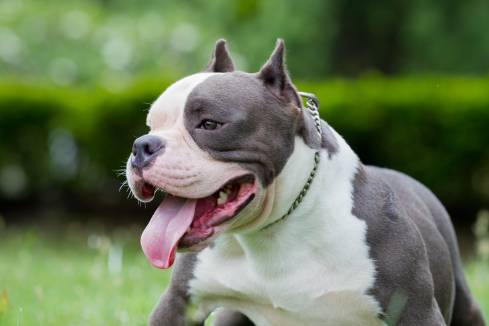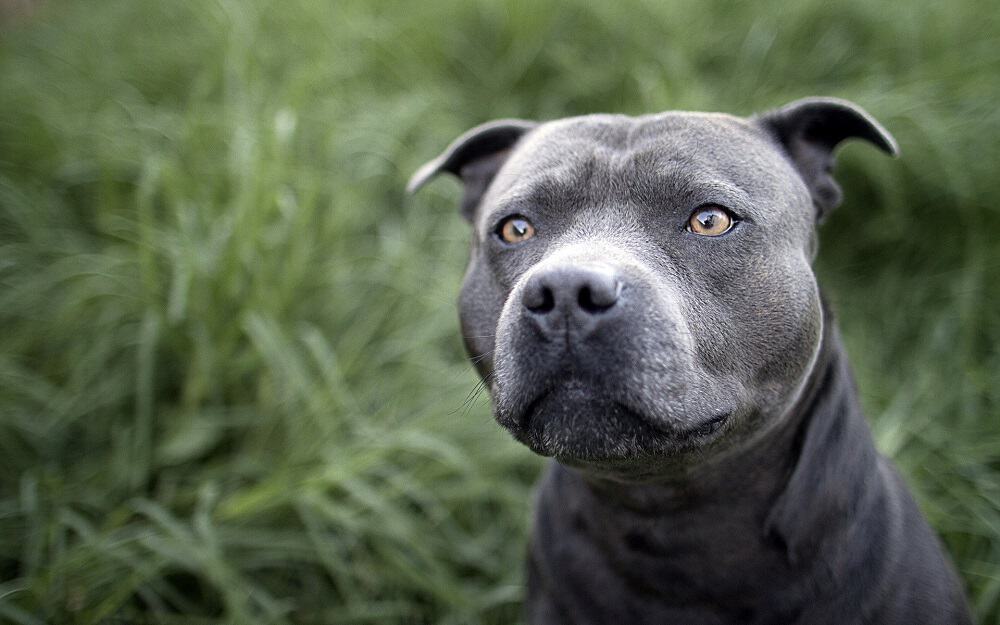Are you a Pit Bull owner and have just learned your fur baby is going to have puppies? Then you’ve come to the right place! If you’re new to the world of Pit Bull pregnancy and Pit Bull puppies, we’ll help answer your questions. How many puppies can a Pit Bull have? What are the signs she’s pregnant or going into labor? Read on to learn about your Pit Bull’s pregnancy and coming puppies!
Connect with a verified veterinarian in minutes. Licensed vets are available 24/7 to answer your questions. No need to worry about your furry family member.
Notes about the Pit Bull Breed
In recent years, Pit Bulls as a breed have become discussed quite a bit in the news. Their potential for aggressiveness has brought about laws banning these precious pups in many areas, leaving owners no recourse but to give up their beloved pets. While this breed can be aggressive, most Pit Bulls are wonderful companions, loyal to their families—including children.
Pit Bulls, on the whole, love people. There will always be some dogs that don’t tolerate other humans and animals near their own families; however, this is true of most dog breeds. Pit Bulls are very loyal and protective and will take actions against what they perceive as a threat.
If you’re the owner of a Pit Bull, it’s important to make sure to spend time with your fur baby as much as possible. Understand the psychology of this breed and be proactive when it comes to taking your precious pup for dog training classes. Be sure to practice what you and your dog learn from the trainer on a regular basis. Pit Bulls, like any other breed, can be trained and socialized to curb aggressive behavior. It comes down to the pet parents to make sure their dog(s) is trained and socialized properly to avoid future problems.
You won’t be able to avoid any and all problems, but proper training can be quite helpful and then you know you’re doing everything possible to be a responsible Pit Bull pet parent
How Many Puppies Can a Pitbull Have on Her First Litter
So, your precious fur baby is expecting puppies! Congratulations! You’re in for quite a bit of joy with these new arrivals! Now, you may be having questions, such as how many puppies your Pit Bull will be having. There are some factors that determine how many little ones your dog may have:
Birth litter size: if your baby girl’s birth litter was large, chances are she will also have a big first litter. Your fur baby will have inherited her mother’s fertility level. So, this is a good indicator of the litter size you can expect.
Size: this is another factor that can determine the size of your dog’s first litter. The larger your dog, the more puppies she could have! In fact, a large female Pit Bull can have up to 10 puppies in one litter! Something to look forward to! Another thing to keep in mind, if this is your dog’s second litter, and she’s a large dog, then she could have up to 14 puppies at one time! However, the normal litter size runs to about 6 puppies.
Heat cycle: you may be wondering how many times a Pit Bull can get pregnant. Pit Bulls generally have two heat cycles per year, about 6 months apart. The first heat cycle usually comes when a dog reaches 6 months of age, with the average heat cycle lasting from 18-21 days.
Gestation: typically lasts about 9 weeks and it’s common for puppies to arrive up to one week early!
So, there you have it! Your fur baby, if she’s large, could have up to 10 puppies in her first litter. If this is her second litter, you can expect up to 14 puppies! The more the merrier, plus the more cuteness and joy to experience with your fur baby’s puppies!
Pitbull Pregnancy Signs
Next, you may be wondering what signs & symptoms your fur baby will display if she’s expecting. Here are some of the most common signs your precious pet could be pregnant:
- Swollen vulva: this gets the attention of male dogs.
- Softened vulva (still enlarged): this usually lasts about 10 days.
- Nipples enlarged
- Increased hunger
- Irritability (may have a short temper)
- Tiredness
- Weight gain
If your precious Pit is showing these signs & symptoms, then it’s a good idea to see the vet for an exam. They can run test and perform a physical exam to determine if your dog’s expecting puppies or not.
Pregnant Pitbull Care
Just like any other pet, your Pit Bull will need to have excellent prenatal care throughout her pregnancy. Not only does this ensure your dog is healthy and stays healthy, but the puppies will also have a better chance at being healthy.
What does prenatal care for a pregnant dog entail? Let’s take a look:
Vet care: you’ll need to take your fur baby to the vet as often as recommended during her pregnancy. The vet may choose to run tests, including tests to confirm pregnancy. These may include blood tests, ultrasound or x-ray images. At a certain stage, the vet will also be able to determine how many puppies you can expect! The count may not be completely accurate, but you’ll at least have a good idea of how many puppies are on the way! Your vet will also ensure that your dog has all her vaccinations and just keep track of her overall health during the pregnancy.
Nutritional requirements throughout pregnancy: a pregnant dog needs to have the best nutrition possible, in order to ensure she has healthy puppies. It may also be necessary to increase the amount of food she eats at each meal, since she’s eating for possibly 5 or more! Optimal nutritional recommendations for a pregnant Pit Bull includes highly digestible food, which she will enjoy. This means a commercial food is probably the best. The food should contain about 29% protein, 17% fat, carbohydrates and be low in fiber, to ensure your pup doesn’t develop hypoglycemia, especially later in her pregnancy. She’ll also need enough calcium (between 1 & 1.8%) for the puppies to have healthy, strong bones, along with phosphorous (between .8% and 1.6%), etc. You might also check with your vet to see if your fur baby might also benefit from dietary supplements during her pregnancy.
Quiet place to rest: your fur baby will enjoy a quiet place to rest. In fact, you could go ahead and create a whelping (birthing) area for your dog head of the birth. This needs to be a quiet spot where your dog will be away from view to care for the puppies without stress. During her pregnancy, she may also enjoy this spot as a good place to rest throughout her pregnancy. Just be sure it’s in an out of the way spot, and make it as comfortable for her as possible. You might include blankets and other bedding to make her comfortable during the pregnancy and after she has the puppies.
Excellent prenatal care can determine the health of your fur baby and her puppies
Do what you can to make sure she receives the care she deserves, and you’ll reap the benefits with a healthy momma dog and healthy puppies
Pregnant Pitbull Signs of Labor
So, what can you expect when your dog goes into labor? What are the signs & symptoms? We’ve got the answers!
Mother dogs sometimes show signs of “nesting” behavior a few days before giving birth. You may notice that she’s making her whelping area more comfortable by rearranging the bedding, etc. This is normal and is a good sign the delivery won’t be too far away! Next, it might be a good idea to take your pup’s temperature a couple of times a day. Her temperature may drop below 100 F (about 38 C). This means your dog’s cervix will dilate sometime within the next 24 hours, which indicates she will shortly give birth.
When your dog begins labor, you’ll want to stay with her. It’s always better to be with your during this time, in case she has birthing or other difficulties. As the puppies are born, you’ll need to count how many she has and make sure that there are the same number of placentas as puppies. If a placenta stays inside your dog, it could cause a problem, such as infection. If you believe a placenta is stuck inside your dog, then get her to the vet as soon as possible.
Your fur baby will first lick the puppies to remove the placenta and help the puppies start to breathe. The momma dog may allow you to help the puppies by gently removing their placentas, then rubbing each puppy with a towel to stimulate their breathing and get them cleaned off. However, if she becomes anxious or aggressive, then follow her lead and leave the puppies for her to care for. Your dog will most likely have a normal labor and delivery; however, it’s a good idea to know what problems and emergencies may come up. The following are emergency situations and your dog will need the vet’s care quickly:
1). Your dog has been pregnant over 70 days.
2). She seems to have extreme pain
3). Labor takes hours, without the appearance of her puppies
Additional problems can be the size of the puppies—if they’re too large, the momma dog may have trouble because the puppies are too large for the birth canal. Another common issue is if the puppies are positioned sideways or bottom first, which can cause them to become stuck. Sometimes one or more puppies may die in utero (in the womb), which can cause positioning problems, leading to a difficult delivery.
If you notice these signs, then it’s imperative to call the vet as soon as possible. Your dog may be in distress and need assistance to save her and the puppies. Helping your fur baby deliver healthy, strong puppies is the goal. Ensuring your Pit Bull has excellent prenatal care, nutrition, a place to rest and prepare for the puppies, etc. can help her all through her pregnancy. Being there when she gives birth is also best, as you’ll be ready to lend a hand if she develops problems during labor or delivery.
We hope this guide has given you some information on how to help your dog all throughout her pregnancy! We wish you, the new momma dog and the puppies all the best and much joy!
Connect with a verified veterinarian in minutes. Licensed vets are available 24/7 to answer your questions. No need to worry about your furry family member.

Kyoko
Kyoko is from a family of 3 and moved to New York with her parents and siblings when she was 13. Kyoko is fond of spending a great amount of time with pets, specifically her beagle Luna and cat Missy. Her boyfriend often complains that she spends too much time giving attention to their animals. Kyoko has written dozens of articles concerning pets and is aiming at owning a pet shop one day!
Review symptoms, medications & behavior to keep your pets healthy with a Vet Online in just minutes.
Ask a Vet Live Now



